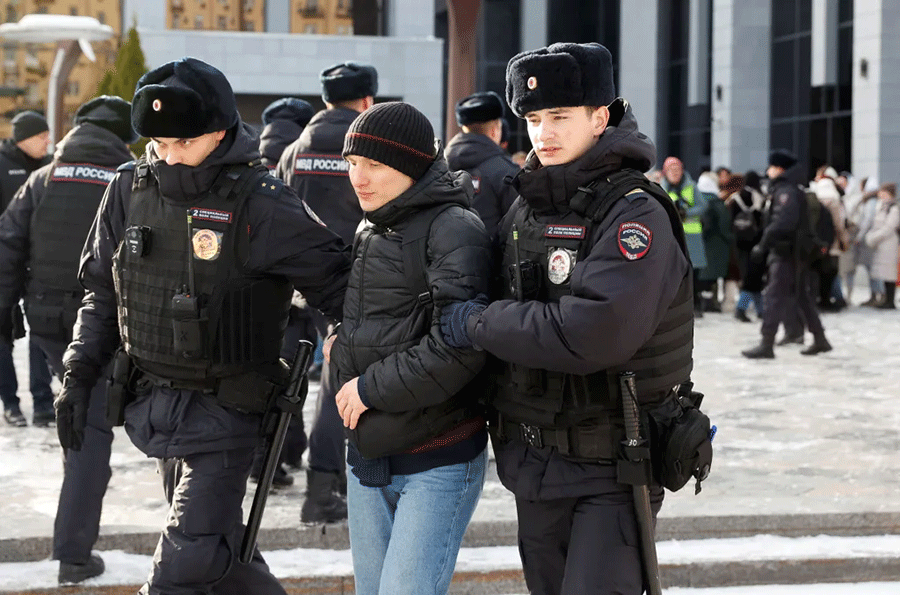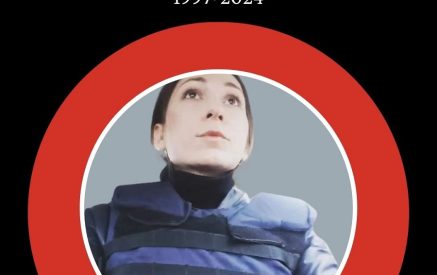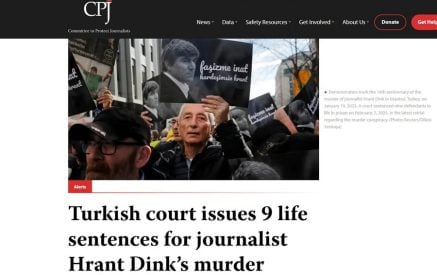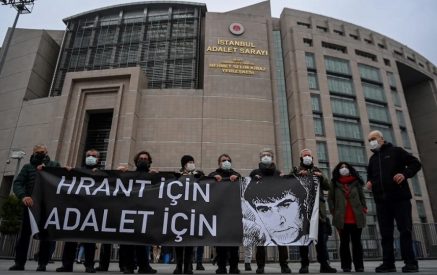Russian authorities must refrain from detaining journalists in the course of their work and allow the media to report freely on protests criticizing the war in Ukraine, the Committee to Protect Journalists said Wednesday.
Around 20 journalists were arrested and briefly detained in the Russian capital of Moscow on February 3 while covering a protest led by a movement of Russian women demanding the return from Ukraine of their men, who were mobilized following a September 2022 decree by President Vladimir Putin, according to multiple media reports and human-rights news website OVD-Info.
The journalists were local and foreign reporters working with multiple international and local media outlets, including global wire service Reuters, French news agency Agence France-Presse (AFP), German weekly Der Spiegel, Dutch public television NOS, Japanese broadcaster Fuji Television, local independent online outlets Sota.Vision and RusNews, the news Telegram channels Ostorozhno Novosti and Mozhem Obyasnit, and the Russian newspaper Kommersant.
Those detained included Sota.Vision reporter Mikhail Lebedev, Kommersant photojournalist Evgeny Razumnyy, Fuji Television journalist Andrei Zaikov, and RusNews reporter Aleksandr Filippov. Most of the other journalists chose not to disclose their names “to avoid problems,” Aleksei Obukhov, exiled editor with independent news outlet SOTA, which covered the protest, told CPJ.
Read also
“An AFP journalist was indeed among a group of journalists arrested last Saturday, even though he was duly accredited to cover the protest. We prefer not to give his name,” an AFP representative told CPJ via email.
“Russia’s latest mass detention of journalists in Moscow is an attempt by the authorities to conceal from the population any dissenting voices on the Kremlin’s war in Ukraine,” said Gulnoza Said, CPJ’s Europe and Central Asia program coordinator. “Journalists are doing their jobs covering the protests and should not be targeted for exposing people’s discontent.”
Around 1 p.m., 20 police officers arrested 13 journalists, who were all male, in Manezhnaya Square, near Red Square, and brought them to the Kitay-Gorod police station in the center of Moscow, one of the detained journalists told CPJ on the condition of anonymity, citing fear of reprisal. According to OVD-Info, 27 people were detained at the Square, “most of them journalists.”
“They were interested in men, especially in yellow vests [which are required by law for journalists reporting from protests],” the journalist told CPJ. “It was fast. The policeman didn’t say a word, he just took me by the shoulder and led me towards the avtozak [police transit vehicle]. At the entrance, we were forced to hand over our documents, mobile phones, and cameras.”
Police refused to give the journalist access to the lawyer sent by his outlet, he told CPJ, adding that he was released a few hours later after authorities photographed his press card and editorial assignment document, questioned his professional activities, and required him to sign a document warning him about “participating in public events.” This document, which states that the police “have information” that he could “violate the law in the future,” can be used as a basis to prosecute him if he is again detained while covering a protest, he told CPJ.
Later, as protestors headed towards President Vladimir Putin’s political headquarters for the upcoming March 2024 presidential election, police arrested seven additional male journalists and took them to the Basmanyy police station in the east of Moscow.
“It was clear they [the police] went after specific people, all men and mostly journalists,” an unnamed witness told POLITICO. “Probably to discourage journalists from covering such events in the future.”
During their detention, the police seized all the journalists’ telephones, OVD-Info reported. CPJ was unable to confirm if all the phones were returned, but the journalist who spoke to CPJ said he believed all had been returned.
After being detained for two to three hours, each of the journalists were released without charge.
“All detained journalists were wearing PRESS jackets and had documents proving their special status, so they should not be detained,” OVD-Info spokesperson Dmitrii Anisimov told CPJ. “We think that this strategy was applied because detaining relatives of Russian soldiers would be rather politically weird for Russian authorities. So they decided to decrease media coverage of these rallies by physically removing journalists from there.”
CPJ did not receive a response to its email to the Moscow police asking for comment on the arrests.
Committee to Protect Journalists

























































